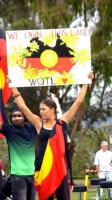A University of Adelaide linguistics expert says reviving dormant languages in Australian Aboriginal communities could lower suicide rates and improve mental health. Research has linked loss of language with self-loathing and rates of suicide now at epidemic levels among Aborigines. Professor Ghil’ad Zuckermann, Australia’s only Chair of Endangered Languages, says activities to resurrect the Barngarla Aboriginal language – with the Barngarla communities of Eyre Peninsula – offer hope in the quest to better understand the significant relationship between linguistic continuity, and social and personal wellbeing.
The
Barngarla community has worked to reclaim their language in close collaboration with
Professor Zuckermann since 2011.
“Since colonisation, Indigenous Australian people have suffered the effects of
wide-scale linguicide,” Professor Zuckermann says. “Out of 330 Aboriginal
languages, only 13 are alive and kicking today.”
Zuckermann said in a radio interview
that he plans to use the revival of Barngarla as the first test. “I
believe that the loss of language is more severe than the loss of land. Language
death in my view means loss of cultural autonomy, loss of spiritual and
intellectual sovereignty, loss of soul, if I may use this term kind of
metaphorically.”
He writes
on his university website: “Language loss, and the consequent lack of cultural
autonomy, intellectual sovereignty and spirituality – not to mention the
dependence on the coloniser’s tongue – unfortunately increase the phenomena of
disempowerment, self-loathing and suicide.
"Colonised people all over the globe sometimes hate not only the
colonisers but also themselves," he says.
Meanwhile twenty-five Indigenous leaders and mental health
experts have taken
their case to the federal government in Canberra, urging it to adopt a
national plan to drive down the rates of suicide in their communities.
WGAR Background to Suicide and Self-harm in First
Nations Communities
https://indymedia.org.au/2014/12/24/wgar-background-to-suicide-and-self-harm-in-first-nations-communities
(last updated: 21 July 2015)


Previous
Aboriginal children as young as nine killing themselves in Australia
Protests in major Australian cities against cuts to Aboriginal services & closure of Aboriginal communities
Tony Abbott and the 40 thieves
Alice Springs paramilitary vigilante leader says Aboriginal people 'stuck in the 1700s'
Call-out for big Aboriginal protest march across Sydney Harbour Bridge
Western Australian minister tells parliament he's 'proud' of world-beating juvenile jailing rate
Police again smash Aboriginal protest camp in Perth
“Take away from me my language, my responsibilities for the land, my land, and I am nothing”
Berlin from 26-28 June: An art installation about the Yolngu people: S.O.S. Australia - restoring dignity
Aboriginal Elders and writers flail invasion of homelands eight years ago in an exciting anthology
Aboriginal actions across the continent to ‘Shutdown Australia’ on 1 June
Decolonisation: to be or not to be included in the Australian constitution?
Remote Indigenous outstation rejects Australian government policy and opens own school
Australia must back indigenous expertise to end crisis of children’s incarceration
Aborigines to visit US and European banks to prevent funding of Australia’s biggest coalmine on their country
More Aboriginal children than ever ripped from their families
Aboriginal women 34 times more likely to suffer family violence
Prominent Aboriginal journalist, Amy McQuire, puts a spotlight on the issue through the voices of several strong Aboriginal women.
She talked to them on 23 July 2015 on Brisbane based Radio 98.9 fm’s “Let’s Talk”, which is syndicated to other Aboriginal stations across Australia on a National Indigenous Radio Service.
Her interlocutors are Safe House employees Yvonne Sampi and Bernadette Angus and Aboriginal traumatologist Judy Atkinson.
If you are deeply interested in Aboriginal affairs, grab a cup/glass of something to relax with, keep people away and listen to 54 minutes about a serious issue in Aboriginal family life.
And if you’re a country music fan, while you’re on the 98.9 site click on the “Live Streaming” box for some of the best country music you’ll ever hear – old, new, US, Australian and from wherever else it happens. You’ll be thrilled.